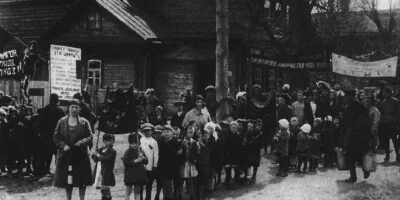Ending Internal Passports Was a Victory of Liberalism. It is Slipping Away

Today, in liberal democracies we take it for granted that any law-abiding citizen or visitor can move freely within the territory of a state. We can contrast this situation with that of regimes such as apartheid South Africa or contemporary mainland China, where the hukou system of residential registration and control of internal movement is a key part of the Communist Party’s system of control, at least in theory.
However, we should not be so complacent. This is actually a historically recent development, the result of liberal ideas and campaigns. In addition, there are trends in many liberal democracies that point to the reappearance of controls on internal movement, not least in the United States. Finally, tighter controls on movement across national frontiers must inevitably lead to controls of various kinds on internal movement and activity, despite what the advocates of these increasingly popular proposals may claim or actually believe.
Medieval and Early Modern Times
For much of history, in many places, the freedom of many people to move or to change their abode for reasons such as looking for work was severely restricted. In much of Western Europe during the Middle Ages and most of Eastern Europe from the 16th century onward, peasant farmers were serfs, tied to a particular location and unable to move without the permission of their lord. In China under most of the dynasties, people needed a pass to leave their county or province, which had to be produced on demand.
This kind of control on movement was not simply a feature of the Medieval period that faded away as time passed. In fact, there was probably more freedom of movement within kingdoms in that period than subsequently. The 16th and 17th centuries saw a major tightening of controls across Europe. This reflected and was driven by a growing panic over the problem of vagabondage, with poor and marginal peasants and agricultural laborers leaving their homes and wandering from one place to another looking for work. The outcome was a spate of legislation in most states that sought to stop this and to control both mobility and access to both paid work and poor relief.
In England, for example, Parliament in 1662 passed the Law of Settlement (actually titled An Act for the Better Relief of the Poor of This Kingdom). This stipulated that people had to have a document that proved their place of work and residence (place of settlement), known as a “settlement certificate.” You could qualify for such a certificate in several ways, including being born in a parish, working within it as an apprentice for a number of years, or simply living there without anyone complaining for 40 days — if somebody did complain before then, you would be expelled from that place and returned to your original place of settlement. You had to take the settlement certificate with you if you moved elsewhere. If you became eligible for poor relief in the place you moved to, then you would be returned to your original place of settlement (as that was the parish responsible for you). People who were found outside their parish looking for work would be whipped or put in the stocks and then returned.
This remained in force until the Poor Law Amendment Act of 1834. England was not unusual; there were similar laws in every European state, large and small. Again, these survived for a very long time; the Swedish law, for example, was not repealed until 1860 and the French one in 1862.
None of this made much difference to the wealthy and the elite, but they were massive restrictions on the liberty of the great majority, particularly the poor. They were subject to strict control of their freedom of movement and in particular were prevented from moving to seek work or to improve their economic situation. In practice, of course, they still did this, but it was made very difficult and criminalized, with the unfortunate ones caught subject to harsh punishment and forcible return. They also had to provide the authorities with details of where they were residing and working and update this; failure to do so again brought penalties.
A Massive Regulatory System
The laws of settlement in every European country were also part of a wider array of laws that controlled many aspects of private life, particularly employment but also marriage and the formation of households. Such laws, including the even harsher ones found in Europe east of the Elbe, had a number of functions, which are clear on reading them and accounts of their enforcement.
Firstly, they were part of a massive system of laws regulating work and employment (other parts were laws on apprenticeship and domestic service, or the monopoly privileges given to guilds). In particular, though, they were aimed at controlling or outright prohibiting movement in search of work or higher pay or migration to seek better conditions in general. As such, they benefited the wealthy and severely disadvantaged the poor and laboring classes.
Secondly, laws restricting migration were aimed at regulating and controlling access to public poor relief and restricting it geographically. In fact, it was the creation of systems of public poor relief during the late Renaissance and Reformation that then inspired the imposition of controls on movement and registration of domicile, in response to political pressure, often provoked by a huge moral panic expressed in the genre of “rogue literature.”
The third purpose was to give rulers knowledge about and control over the population in general. This was most striking in the German and Italian states, and also in the French and Spanish monarchies. In Eastern Europe, such as Poland-Lithuania and Russia, this was true to an even greater degree, with the immobile serf class deprived of most legal rights and subject to detailed control and supervision.
In colonial territories, there was an additional purpose: to control the indigenous population and, above all, to sustain slave labor. Thus, Canada had an internal passport system for First Nation people for many years after 1885. In the slave states of the United States, all slaves had to carry a pass if they left their plantation, with regular slave patrols enforcing this. The Confederacy extended this system to the population in general, so that it applied to poor whites as well.
The Liberals’ Campaign
The laws of settlement and internal passports were criticized trenchantly by liberals, from the 1760s onward. Adam Smith devoted a significant section of The Wealth of Nations to attacking them, in pungent and forceful terms. Abolishing these controls and restrictions was a central demand of liberals throughout Europe in the 19th century. They attacked them on two grounds: economically, because they stopped people improving their condition and obstructed the efficient workings of the economic system in a way that disproportionately harmed the poor; politically, because they were a fundamental violation of individual liberty and autonomy and gave rulers power, knowledge, and control that were none of their business.
The campaign against them was long and difficult (involving of course a war in the United States), but by the late 19th century they had been abolished in most of Europe. The major partial holdouts were Russia and the Ottoman Empire (although in both cases the scope had been massively reduced). The abolition of internal registration and control went along with a dramatic decline in controls on movement across political frontiers and a decline in the use of passports. This began to change in the first decade of the 20th century with measures such as the 1905 Aliens Act in the UK, but in 1914 Turkey and Russia were still the only major exceptions to a policy of free movement internally and internationally.
Today, however, every sovereign state has controls on their borders — there was a major movement here after 1914. There is also a growing demand in politics for these controls to be tightened and made more punitive in their enforcement. The assumption of most of the advocates of this (popular) demand is that tighter controls on international movement are compatible with or even necessary for freedom of movement internally. The case is exactly the opposite.
Moreover, there are many developments that are producing a clear movement back to the kind of regime that existed in Ancien Regime Europe. The essential fact is that you cannot have controls on movement into a state without having controls on the actions and ultimately movement of people who live within that state. This arises from two basic realities.
In the first place, migrants are not a natural kind or type (a point made in part from an unpublished work by Chandran Kukathas and I thank him for this insight). The questions of what counts as an act of migration and who counts as a migrant do not have simple and obvious answers: they are inevitably political decisions and determinations. What this involves is making a distinction between permanent residents and visitors, and because this can often not be done on sight it requires documentation that can then be produced, which has to be made obligatory for everyone. In addition, because so much migration, as before, is economic, there has to be supervision and control of the residential population in their capacity as employers, retailers, landlords, customers, and so on. All this, again, cannot work unless there is a system of identification, supervision, and regulation in place.
Contemporary Relevance
The UK case illustrates this. Britain has had significant inward migration from other parts of the EU. There is now considerable popular pressure to tighten up on this, from even before the Brexit referendum. However, this is practically impossible for the British state, because the UK, unlike other European states, does not have compulsory registration of abode and a compulsory identity card, and this makes tracking and controlling migrants effectively impossible. If the British public wants to have tighter border controls, in a world of increasing migration, they will also have to have things like identity cards for all.
Such a move is also increasingly likely to lead to a system where documents have to be produced on demand (like the settlement certificate) by those travelling or moving within a state. In that case, liberal freedom of movement is ended. In some countries, such as Russia and China, this is already the case. The US is a dramatic example of a de facto move in this direction. Here, from October of next year, all US citizens will have to have a Real ID–compliant card or US passport to board a plane — even for an internal flight — or to enter any federal government building. (See the column here by Peter Earle titled “While You Slept, Government Created Internal Passports.”)
Even in the Land of the Free, people are ever more often required to produce identification and record movement. Just as in the 16th and 17th centuries, this is driven by efforts to control the labor market, regulate access to welfare, and limit the ability of poorer people to move so as to improve their condition. In the same way that there was a moral panic about “sturdy beggars and vagabonds” that enormously exaggerated a problem of migrant labor, so we now have a series of moral panics about terrorism and the threat posed by migration.
We should never take the victories of previous generations of liberals for granted. Free movement is one of those. There are always those who will seize on any problem or challenge, real or imaginary, to expand the scope of power and to restrict liberty. Those who think we can have the movement within states that liberal reformers won less than 160 years ago while controlling other things, particularly work and movement between states, are in for an unpleasant surprise.












